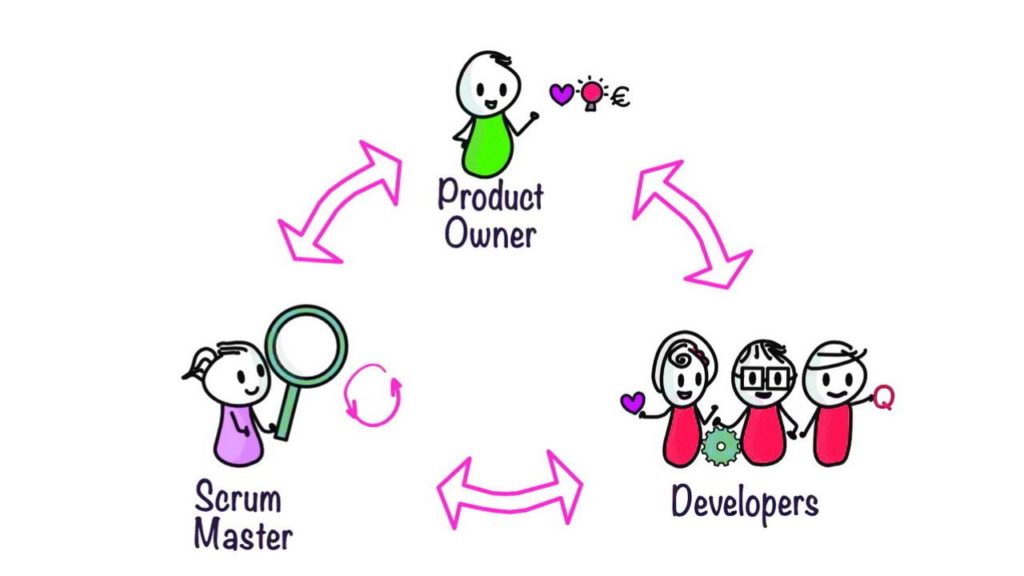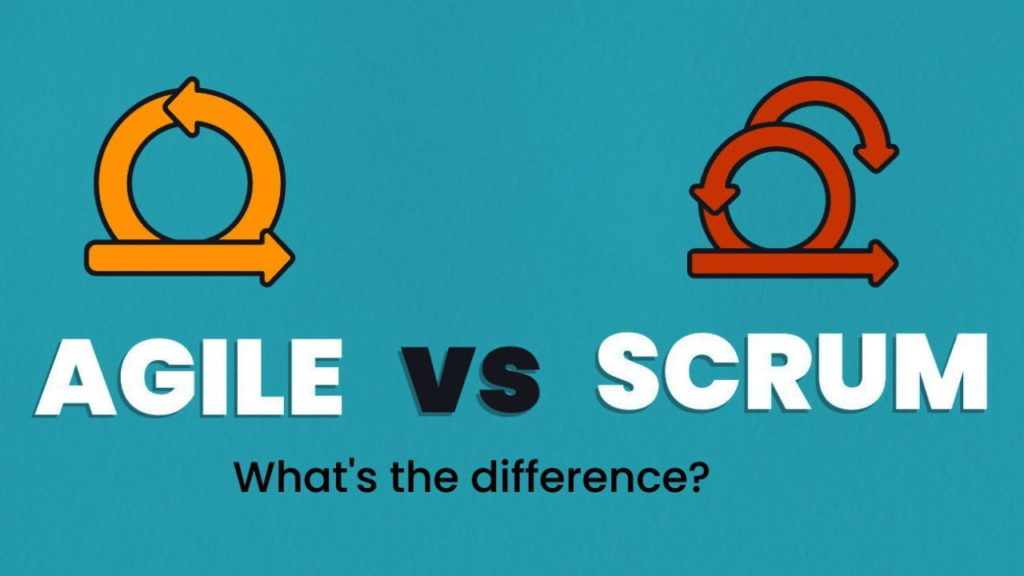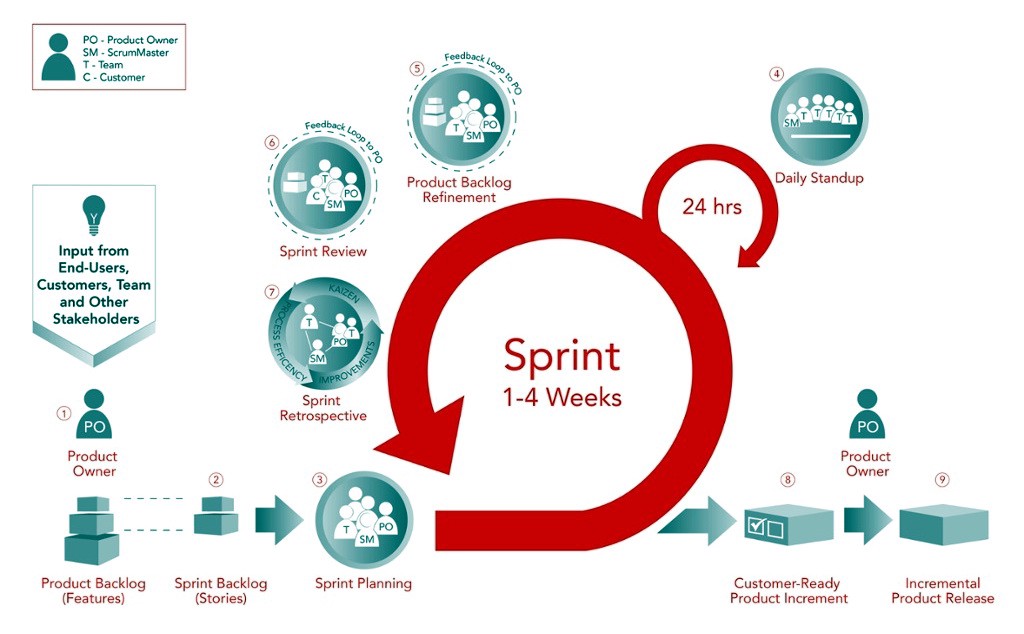What is Scrum Framework?
What is Scrum Framework?
The Scrum Framework is a lightweight and flexible approach used to address complex problems and generate value in various domains, including software development and beyond. It provides a set of guidelines and practices that enable teams and organizations to collaborate effectively, adapt to change, and deliver high-quality products or solutions.
Originally developed for software development projects, Scrum has found applications in diverse fields such as research, sales, marketing, education, and advanced technologies. It emphasizes iterative and incremental development, promoting transparency, inspection, and adaptation throughout the project lifecycle.
In Scrum, work is organized into time-boxed iterations called “sprints,” typically lasting one to four weeks. The framework defines three primary roles: the Product Owner, who represents the stakeholders and prioritizes work; the Scrum Master, who facilitates the Scrum process and removes impediments; and the Development Team, responsible for delivering the product increment.
Scrum employs various ceremonies or events, including sprint planning, daily stand-ups, sprint reviews, and retrospectives, to ensure effective collaboration, communication, and continuous improvement. The artifacts in Scrum, such as the product backlog and sprint backlog, provide transparency and enable the team to track progress and prioritize work.
The Scrum Framework empowers teams and organizations to embrace adaptability, transparency, and self-organization, enabling them to deliver valuable outcomes while responding to changing requirements and customer needs.
Before diving into how Scrum works, I highly recommend watching this concise 10-minute course on the Scrum framework to gain a broader understanding: Introduction to Scrum Framework.
How does Scrum work?
Scrum is a framework that is relatively easy to learn but requires expertise to master. The co-creators of Scrum, Jeff Sutherland, and Ken Schwaber, have provided comprehensive explanations of the underlying concepts in The Scrum Guide. The Scrum Guide offers a detailed overview of Scrum processes and effective implementation strategies.
At its core, Scrum revolves around a self-organizing team that delivers customer value within a time-boxed period known as a Sprint. Scrum defines specific artifacts, roles, and events associated with each Sprint. Let’s delve into each of these components in detail.
What are the key principles and values that guide the implementation of the Scrum framework?
Scrum framework is characterized by a set of principles and values that guide its implementation:
- Transparency: Scrum promotes an environment where all team members are aware of the challenges faced by others. Regular face-to-face conversations among cross-functional team members and project owners prevent miscommunication and information bottlenecks.
- Reflection: Scrum incorporates frequent reflection points within the framework, allowing team members to review their progress. Project managers utilize insights from these review meetings for estimation and future planning. As a result, projects can run more efficiently, within budget, and on schedule.
- Adaptation: Team members have the flexibility to reprioritize tasks based on changing customer requirements. They decide which tasks to complete first and which to revisit in the future, ensuring adaptability and responsiveness.
What are the 5 core values that Scrum Teams embrace for effective project collaboration?
Scrum Teams embrace five core values:
- Commitment: Scrum Team members are dedicated to time-based tasks and goals, continuously striving for improvement and finding the best solutions.
- Courage: Scrum Teams exhibit courage by openly asking challenging questions. They engage in honest and transparent discussions to arrive at optimal solutions.
- Focus: During a specific period, team members work from a Product Backlog of tasks and concentrate on selected items to deliver within a defined timeframe.
- Openness: Scrum Team members are receptive to new ideas and opportunities that foster individual learning and enhance overall project quality.
- Respect: Team members demonstrate respect towards project managers, colleagues, and the Scrum process. This culture of respect fosters a spirit of collaboration and cooperation within the team.

What are the 3 roles that play a pivotal part in the Scrum framework?
The Scrum framework consists of three key roles: Product Owner, Scrum Master, and developers.
The Product Owner in Scrum
Firstly, the Product Owner defines project goals, and priorities, and ensures a focus on valuable items. Effective product owners fulfill the following responsibilities:
- Provide clear guidance to the team regarding which features to deliver next.
- Bridge the gap between the business requirements and the team’s understanding.
- Determine the frequency and timing of releases.
The Scrum Master
Secondly, the Scrum Master facilitates the process and ensures adherence to the framework’s rules. They are also responsible for the following:
- Scheduling the necessary resources for each Sprint.
- Facilitating Sprint events and team meetings.
- Leading digital transformation efforts within the team.
- Facilitating team training during the adoption of new technologies.
- Communicating with external groups to address any challenges faced by the team as a whole.
Developers in Scrum
Lastly, Developers are responsible for delivering product increments at the end of each time-boxed Sprint. Scrum developers perform the following tasks:
- Collaboratively work towards successful Sprint completion.
- Advocate for sustainable development practices.
- Self-organize and approach projects with a collective mindset.
- Drive planning and estimation for the amount of work they can complete within each Sprint.
- For large enterprise projects, the recommended team size is around 9 members, including the Product Owner, Scrum Master, and Developers.
Smaller projects typically have 4-5 team members, encompassing the essential roles.
What are Scrum artifacts?
Scrum Teams utilize specific tools, known as Scrum artifacts, to solve problems and manage projects. These artifacts provide crucial planning and task information to team members and stakeholders. The three primary artifacts in Scrum are:
- Product Backlog: The Product Backlog is a dynamic list of features, requirements, enhancements, and fixes that contribute to project success. It serves as the team’s to-do list, constantly reevaluated and reprioritized to adapt to market changes. The product owner maintains and updates the list, removing irrelevant items and incorporating new customer requests.
- Sprint Backlog: The Sprint Backlog consists of the items that the development team commits to completing during the current Sprint cycle. Before each Sprint, the team selects which items it will work on from the Product Backlog. The Sprint Backlog is flexible and can evolve throughout the Sprint.
- Increment: The Increment represents a step toward the project’s goal or vision. It is the usable end product resulting from a Sprint. Scrum Teams employ various approaches to define and demonstrate their Sprint Goals. Regardless of the method, the fundamental Sprint Goal must remain intact, representing the team’s achievement at the end of the current Sprint. For instance, some teams release software changes to customers, considering the Sprint Goal accomplished upon successful release. Other teams focus on completing a set of features to be released simultaneously, considering the Sprint Goal fulfilled when the features pass testing.
What are Scrum events?
Scrum events, also known as Scrum ceremonies, are a series of sequential meetings that Scrum Teams regularly conduct. These events provide structure and opportunities for collaboration and synchronization. Some key Scrum events include:
- Sprint Planning: During this event, the team estimates the work to be completed in the upcoming Sprint. Team members define specific, measurable, and attainable Sprint Goals. By the end of the planning meeting, every Scrum team member understands how each Increment can be delivered during the Sprint.
- The Sprint: A Sprint refers to the designated time period during which the Scrum Team collaborates to deliver an Increment. The typical length of a Sprint is two weeks, but it may vary depending on project requirements and team dynamics. The complexity of the work and the level of uncertainties often dictate the duration of a Sprint, with shorter Sprints preferred in more complex scenarios.
- Daily Scrum or Daily Stand-up: The Daily Scrum is a brief meeting in which team members check in and plan for the day. They share updates on completed work and voice any challenges they face in meeting Sprint Goals. The meeting is called a stand-up to encourage brevity, ensuring it remains practical and time-efficient.
- Sprint Review: At the end of each Sprint, the team conducts an informal session to review the work completed and showcase it to stakeholders. The Product Owner may also refine the Product Backlog based on the insights gained from the current Sprint.
- Sprint Retrospective: The team gathers to document and discuss the successes and areas for improvement identified during the Sprint. The insights generated during this event are used to enhance future Sprints.
Now, watch this short video to understand, Why Scrum, Why Now, and Why You…
Why is Scrum important in software development?
While Scrum can be effective in various team environments like HR, marketing, and design, it is particularly prevalent in software development and engineering teams. Scrum enables teams to respond swiftly to changing requirements without letting costs and budgets spiral out of control. The importance of Scrum in software development can be attributed to the following factors:
- Maintaining quality in challenging situations: Scrum incorporates quality assurance checks within its framework. Teams define requirements at the beginning of each Sprint and continuously assess the software or product life cycle, ensuring that requirements remain relevant and achievable within short time frames. Regular feedback from the Product Owner and Sprint reviews facilitate ongoing team improvement throughout the project.
- Increased return on investment: Scrum Teams prioritize requirements based on customer value and risk analysis. The focus lies in developing a primary working product that can be released to the market early, gathering valuable customer feedback. Scrum development emphasizes fewer costly defects, team efficiency, and a fail-fast approach that saves money in the long run.
- Fostering happier and more productive teams: The self-managed and self-organized nature of Scrum enables team members to be more creative and innovative. They have the flexibility to organize their work according to their work styles, personalities, and personal goals. Working cross-functionally allows members to learn new skills and mentor each other, fostering an environment of support, trust, and increased motivation.
- Relevant metrics for improved estimation: Scrum Teams have the autonomy to choose metrics that measure project performance. They estimate timelines, budgets, and quality metrics based on their experience and capabilities. By using relative estimates, the Product Owner gains control, and teams receive more support at the project’s start, naturally increasing their speed over time. Working products are regularly reviewed by project stakeholders, providing continuous feedback and ensuring the project stays on track.

What are the 5 reasons why disregarding Scrum can result in disorganization and missed opportunities?
Ignoring Scrum poses abundant and far-reaching dangers. Teams and individuals expose themselves to a range of dangers by not utilizing Scrum. Below, you will find a few perils that await those who neglect Scrum’s invaluable guidance.
- Missed Entry into the High-Demand Job Market: In today’s competitive job market, Scrum has become a sought-after skill. By not adopting Scrum, individuals risk missing out on lucrative job opportunities and limiting their chances of entering high-demand industries where Scrum is highly valued.
- Stagnant Salary Growth: Scrum professionals often command higher salaries due to their expertise in delivering value and driving successful projects. Neglecting Scrum can hinder career advancement and limit salary growth potential, as employers increasingly recognize the value of Scrum in achieving business objectives.
- Paying for Expensive Colleges without Promised Outcomes: Higher education institutions often come with hefty price tags, promising students a rewarding educational experience and enhanced career prospects. However, without Scrum, students may find themselves lacking the practical skills and adaptability needed to succeed in the workforce, leading to a disconnect between the expensive investment and the promised outcomes.
- Disorganized Workflows: Operating without Scrum’s structured framework can pave the way for disorganized workflows. This disarray often leads to missed deadlines, compromised quality, and frustrated team members.
- Scattered Priorities: Teams may struggle to maintain a focused approach without Scrum’s guidance. Scattered priorities become the norm, resulting in wasted time and resources as less important tasks take precedence. This lack of focus ultimately jeopardizes project success, hindering the team’s ability to deliver value within the desired timeframes.
5 More Reasons Why Scrum Ignorance Leads to Disarray and Lost Chances
- Ineffective Time Management: Scrum’s time management principles play a vital role in breaking down projects into manageable tasks. Without Scrum, teams can easily over-commit themselves and struggle to fulfill their obligations. The team’s lack of a systematic approach to time management leads to inefficiencies, compromising their ability to meet deadlines and deliver high-quality results.
- Missed Deadlines: Disregarding Scrum often results in the team missing deadlines, causing disappointment among stakeholders and tarnishing their reputation. By neglecting the framework’s essential practices, teams sacrifice their ability to deliver on time and meet customer expectations, resulting in lost opportunities and potential revenue.
- Subpar Academic Performance: For students, the absence of Scrum can have detrimental effects on academic performance. Students who do not embrace Scrum may struggle to stay organized, meet deadlines, and excel in their studies. Subpar performance not only affects grades but also limits opportunities for growth, scholarships, and future career prospects.
- Missed Opportunities for Teamwork and Collaboration: Scrum places a strong emphasis on teamwork and collaboration, fostering the development of essential interpersonal skills. Students who do not embrace Scrum miss valuable opportunities to engage in effective teamwork, share ideas, and leverage the collective intelligence of their peers. This absence inhibits their ability to thrive in group settings and limits their potential for success in both academia and the workforce.
- Resistance to Change and Fixed Mindsets: Scrum nurtures adaptability and a growth-oriented mindset, encouraging individuals to embrace change and explore new possibilities. Without Scrum, students may become resistant to change, hindering their ability to think creatively, tackle challenges, and adapt to evolving environments. This resistance limits their personal and professional growth potential, constraining their ability to navigate the ever-changing landscape of the modern world.

Scrum vs. Agile – What is the difference?
Agile refers to a mindset or way of thinking in software development, encompassing a philosophy adopted at the organizational level to drive continuous improvement and value delivery to customers. Scrum, on the other hand, is a framework used to implement agile principles and facilitate project management. While Scrum incorporates all the core principles of agile, it is crucial to note that not all methodologies that take an agile approach fall under the umbrella of Scrum.
How can Scrum developers adopt DevOps?
DevOps combines cultural philosophies, practices, and tools to enhance an organization’s ability to deliver applications and services at high velocity. DevOps aims to bridge the gap between development and operations teams, encouraging engineers to work across the entire application life cycle, from development to testing, deployment, and operations. Scrum Teams are well-positioned to adopt DevOps due to their existing cross-functional and iterative nature. Here are some ideas for integrating DevOps into Scrum development:
- Automated software testing: Scrum Teams can automate software testing and create new tests for each feature developed, ensuring efficient and reliable testing processes.
- Leveraging technology stack and tools: Adopting a technology stack and tools that support continuous deployment enables Scrum Teams to release changes to production at the end of each Sprint, promoting frequent and iterative deployments.
Remember, while implementing these practices, it is essential to tailor them to the specific needs and context of your Scrum development team. Regularly evaluating and adjusting your processes will help optimize delivery and ensure continuous improvement.

How can one become an expert in Agile and Scrum methodologies?
Understanding the Scrum framework is essential for modern project management practices. Implementing Scrum can significantly enhance team efficiency and project success.
You don’t need a college degree or an IT background to become a Scrum Master, Product Owner, or Developer.
All Scrum roles are in high demand and offer competitive salaries. With my proven system and your commitment to learning, you’ll gain the skills and knowledge you need to succeed.
To become proficient in Scrum, there are several prerequisites that can contribute to your success. Here are some key aspects to consider:
- Knowledge of Agile principles: Familiarize yourself with the fundamental concepts and values of Agile methodologies. Understand the iterative and incremental approach, flexibility, and collaboration principles.
- Scrum framework understanding: Gain a solid understanding of the Scrum framework, including its roles, events, artifacts, and interactions. Learn about Scrum ceremonies such as daily stand-ups, sprint planning, sprint reviews, and retrospectives.
- Scrum Guide: Study the official Scrum Guide, which provides a comprehensive overview of Scrum practices and guidelines. This document outlines the roles, responsibilities, and rules of the Scrum framework.
- Scrum Master certification: Consider obtaining a Scrum Master certification to validate your knowledge and skills. Certifications such as Certified ScrumMaster (CSM) or Professional Scrum Master (PSM) can enhance your credibility as a Scrum practitioner.
- Practical experience: Apply Scrum principles and practices in real-world projects. Gain hands-on experience by working as a Scrum team member or Scrum Master. Embrace opportunities to collaborate, plan and execute sprints, and continuously improve your Scrum implementation.
- Continuous learning: Stay updated with the latest developments in Scrum and Agile methodologies. Attend workshops, conferences, and webinars. Engage in communities of practice to learn from experienced practitioners and share knowledge with peers.
Remember that becoming proficient in Scrum is an ongoing journey that requires continuous learning, practical application, and adaptation to different project contexts.
Don’t wait, take the first step toward your Scrum career today!
BONUS – TEST YOUR SCRUM KNOWLEDGE
Discover where you stand in the world of Scrum with our quick, insightful quizzes! Whether you’re an individual or a company, our assessments can help you gain valuable insights.
To access our Free Scrum Quizzes, please email agileandscrummasterclass@gmail.com with the subject line ‘Scrum Quizzes’. In the body of the email, include your full name and location. I look forward to sending you access links immediately!
Conclusion
Scrum is an effective management framework used by teams to self-organize and collaborate towards a shared goal.
It provides a set of meetings, tools, and roles to facilitate efficient project delivery. Similar to a sports team preparing for a big match, Scrum practices empower teams to self-manage, learn from experience, and adapt to change. In the realm of software development, Scrum is widely employed to solve complex problems in a cost-effective and sustainable manner.
If you are interested in pursuing this career and seeking a comprehensive solution for yourself or your team member, I recommend taking the eligibility quiz to determine the best fit.
You might also find interesting:
